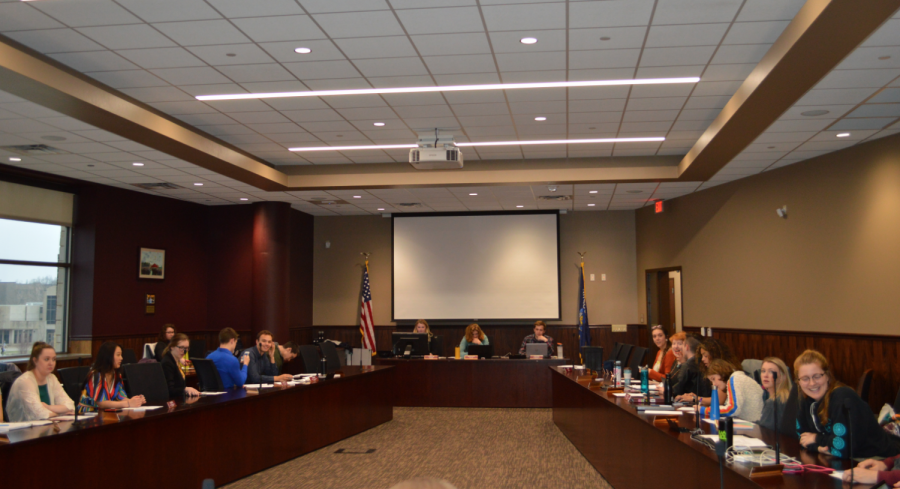Joe Gow and Rep. Jill Billings speak to Student Senate
April 19, 2019
Members of the Student Senate convened for their weekly meeting on Wednesday, April 17. Following the consent agenda, the Senate welcomed Chancellor Joe Gow.
Gow offered to answer general questions from the Senate regarding current university issues. Sen. Micech asked the first question regarding an email from Gow discussing an anti-abortion protest on campus, in which he said, “Their views are not necessarily representative of the University’s beliefs and values.”
Sen. Micech noted that they “thought there was some bias towards pro-lifers” in this message.
Gow responded that he could “never say the university is of a single mind on some issue,” clarifying that some members of the university community expressed views in line with pro-life beliefs.
Sen. Cayo asked a follow-up question about the presence of anti-abortion advocates outside the free-speech zone, wondering “What could be done to prevent people from using not-free speech areas.”
Gow responded by saying there are no restrictions in public areas because the University being on public land.
Sen. Given asked Gow whether he would “be interested in supporting a space on campus for smudging,” a ceremony practiced by some indigenous peoples.
Gow discussed the limited space on campus, noting that “you would have to take space away from someone or something, and they may not be very excited about that.”
Sen. Given followed up by asking “about a place for general religiosity.”
Gow called it an “interesting idea,” saying “I’d like to check with the legal people” while continuing to stress that “finding space would be challenging.”
Sen. Given then asked, “Will the land recognition statement be read at graduation?”
Gow responded by saying, “My issue with the land recognition statement is it’s not historically accurate.”
Gow explained that his principal concern is with the term “occupy,” noting that the University was not the aggressor in forcing indigenous peoples from their lands, having not yet been established as an institution. He agreed, however, that the situation was “tragic.”
Sen. Gerke asked, “What role do you think the chancellor’s office plays in retaining faculty, at least generally,” to which Gow discussed the limited role a chancellor plays in faculty retention.
He also discussed the necessity of the chancellor participating in faculty activities when necessary but respecting boundaries, saying “There are people who want me nowhere near that. Someone once said a professor reserves the right to be left alone.”
Finally, Sen. Fisher asked Gow to elaborate on statements of inclusivity, saying “earlier you said you support inclusivity and diversity on this campus. How could you advocate for that on campus?”
Gow explained, “ I am proud that we now have a division of diversity and inclusion. Is that going solve everything?” he said. “No. But it’s a step in the right direction.”
During officer reports, State Affairs Director Lawlis discussed a lobbying trip on April 25, saying the itinerary had been finalized. “It’s usually a pretty good conversation, you learn some stuff. It’s an interesting experience to meet these representatives and discuss some issues,” he said of the event.
Student Senate Sustainability Director Wolfe discussed the Grandad Bluff Clean Up, which will take place on Saturday, April 20, as well as a screening of the Lorax at the Union Theater on Monday, April 22, which marks the celebration of Earth Day.
Rep. Jill Billings was the evening’s second guest speaker, updating the Senate on the building committee’s actions on the capital plan for upcoming project renovations at UWL.
“I was asked to come to talk to you tonight to give you an update on the projects and where they’re at,” said Billings, introducing herself. She discussed how the building committee has a 4/4 split between Republicans and Democrats, with Republicans favoring a motion of no recommendation for all proposed projects and Democrats voting in favor.
Every single project failed to win approval, including Phase II of the Prairie Springs Project. Billings said, “The Building Commission has never, ever, sent no projects to the joint finance committee,” calling it a “very unusual situation.”
She also addressed the Senate’s resolution voicing support for a new residence hall project. “The reality is that with the Governor’s budget, he just looked at renovating buildings or fixing buildings” saying the chances of a new residence hall were “zero.”
Billings discussed the worry that Phase II of the Prairie Springs Project would be delayed due to Republican desires to cut the budget and other universities rallying for their own science buildings. “My best guess is that Republicans will come up with their budget, the governor will likely have to veto it, and then they’ll likely sit down [to negotiate]” she said.
The Senate then discussed the resolution to recommend the creation of a deactivated course list. After rejecting the idea of tabling the resolution, the Senate approved it by a 96%-4% vote. The Senate also discussed a resolution opposing the Senate Bill 150 and Assembly Bill 160, authored by President O’Connell and Jack Lawlis.
O’Connell explained both bills would make “seg fees payable on a per credit basis.” O’Connell called the bill “concerning” and said it could result in “the significant loss of funding.” This was followed by a discussion of the resolution to endorse the FY20 segregated fee package.
Show Global Grounds cashier this article for a FREE bagel with the purchase of a regular-priced drink! Limit one coupon per customer.






